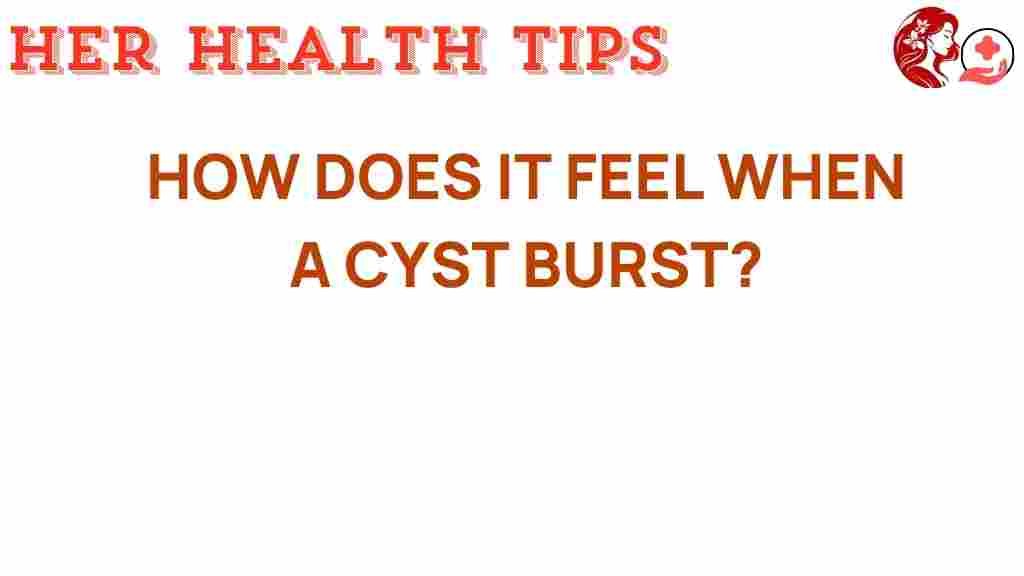The Hidden Agony: What Happens When a Cyst Bursts?
When it comes to our health, awareness is key. Many individuals may not fully understand the implications of a cyst burst and what it means for their well-being. This article dives deep into the symptoms, pain, and medical advice surrounding cysts, aiming to provide readers with a comprehensive understanding of this often-overlooked health issue.
Understanding Cysts
A cyst is a closed sac-like structure that can be filled with fluid, pus, or other materials. Cysts can occur in various parts of the body, including the skin, ovaries, and kidneys. While many cysts are benign and may not cause any symptoms, they can become problematic if they burst.
What Causes a Cyst to Burst?
Several factors can lead to a cyst burst, including:
- Infection: An infected cyst often leads to increased pressure and may eventually rupture.
- Trauma: Physical injury to the area where the cyst is located can cause it to burst.
- Size: Larger cysts are more prone to bursting due to their increased pressure.
- Hormonal changes: Fluctuations in hormones, especially in women, can affect ovarian cysts.
Symptoms of a Cyst Burst
Recognizing the symptoms of a cyst burst is crucial for timely treatment. Common symptoms include:
- Sudden Pain: This is often described as sharp or severe and can occur suddenly.
- Swelling: The area around the cyst may become swollen and tender.
- Redness: Skin over the cyst may appear red or inflamed.
- Fever: In some cases, a fever may develop, indicating an infection.
- Nausea: Some individuals may also experience nausea or vomiting.
The Pain Associated with a Cyst Burst
The pain from a cyst burst can vary in intensity, depending on the location and size of the cyst. For instance, a burst ovarian cyst can cause significant abdominal pain, while a skin cyst may result in localized discomfort. It’s important to seek medical advice if the pain is severe or persistent.
Medical Advice: When to Seek Help
Not every cyst that bursts requires immediate medical attention; however, there are specific scenarios where professional help is necessary:
- If you experience severe pain that does not subside.
- If you notice swelling or redness around the area.
- If you develop a fever or other signs of infection.
- If you have persistent nausea or vomiting.
In such cases, it is crucial to consult with a healthcare provider to assess the situation and determine whether further treatment is needed.
Diagnosis of a Burst Cyst
Diagnosing a cyst burst typically involves:
- Physical Examination: A doctor will examine the area to check for swelling, tenderness, and other signs.
- Imaging Tests: Ultrasound or CT scans may be conducted to visualize the cyst and assess any complications.
- Blood Tests: In cases of suspected infection, blood tests may be performed to check for elevated white blood cell counts.
Treatment Options for a Burst Cyst
The treatment for a burst cyst largely depends on the symptoms and complications. Options may include:
- Observation: In cases where symptoms are mild, a doctor may recommend monitoring the situation.
- Pain Management: Over-the-counter pain relief medications can help alleviate discomfort.
- Antibiotics: If an infection is present, antibiotics may be prescribed.
- Surgery: In severe cases, especially with ovarian cysts, surgical intervention may be necessary.
Recovery from a Cyst Burst
Recovery time from a burst cyst can vary widely depending on the individual and the treatment required. Generally, those who experience mild symptoms may recover quickly, while others requiring more invasive treatment may take longer. Here are some tips for a smooth recovery:
- Rest: Ensure you get plenty of rest to help your body heal.
- Hydration: Stay hydrated by drinking plenty of water.
- Follow Medical Advice: Adhere to any medication or treatment plans provided by your healthcare provider.
- Monitor Symptoms: Keep an eye on your symptoms and report any changes to your doctor.
Awareness and Prevention
Awareness is critical when it comes to cysts and the potential for them to burst. Here are some preventive measures to consider:
- Regular Check-Ups: Have regular health check-ups to monitor any existing cysts.
- Healthy Lifestyle: Maintain a balanced diet and regular exercise to support overall health.
- Know Your Body: Be aware of any changes or symptoms in your body and seek medical advice when necessary.
Conclusion
A cyst burst can be a source of hidden agony, leading to significant pain and discomfort. Recognizing the symptoms and knowing when to seek medical advice can make a crucial difference in managing the situation effectively. Understanding the diagnosis, treatment options, and recovery process is essential for anyone who may experience this health issue.
Stay informed, stay aware, and prioritize your health. For more information on health and wellness, you can visit this resource. Remember, when it comes to health, knowledge is power.
For more detailed information on cysts and potential treatments, consult with your healthcare provider or check reputable sources like Mayo Clinic.
This article is in the category Conditions and created by HerHealthTips Team
